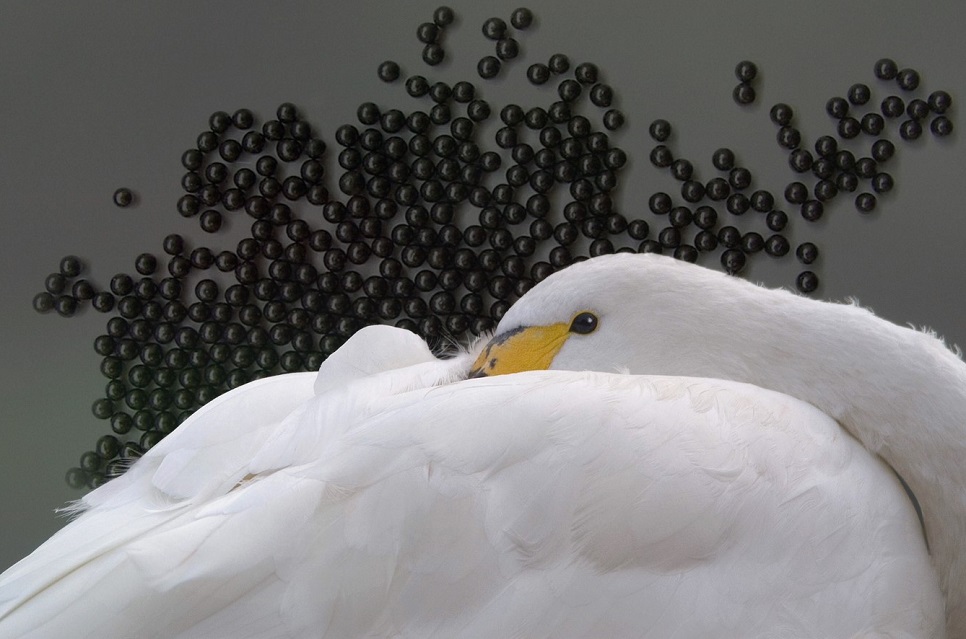Duke of Edinburgh honours WWT’s spoon-billed sandpiper team

The Wildfowl and Wetlands Trust (WWT) Conservation Breeding Team has been honoured with the BTO's Marsh Award for Innovative Ornithology, for their part in the attempt to save the Spoon-billed Sandpiper - one of the rarest birds in the world - from extinction.
The award, presented by HRH The Duke of Edinburgh, was received by Nigel Jarrett, WWT’s Head of Conservation Breeding, at the BTO ceremony in London.
The spoon-billed sandpiper is one of the world’s rarest and most unusual birds. It is a wading bird, barely larger than a sparrow, born with a spoon-shaped bill – the only bird with such an adaptation. It faces a multitude of threats between the tropics of South Asia and its breeding grounds on coastal tundra in the Russian Far East, 5,000 miles away. Chief among them is illegal trapping and the reclamation of wetlands along their migration-route.
When it was discovered that only 100 breeding pairs existed in the wild, WWT's first objective was to secure eggs from the few remaining nests at the spoon-billed sandpiper's remote breeding grounds in Chukotka, Russia. This was done over two years and the WWT team now has a small flock - the nucleus of a conservation breeding programme - in specially designed quarters at WWT Slimbridge. The flock is a backup in case the species goes extinct in the wild.
The second part of the project has been ‘head-starting’, with Nigel's team taking and hatching eggs in Russia, hand-rearing the chicks, then once old enough, returning these critically endangered birds to the wild to resume normal migratory behaviour and eventually return to Russia to breed. In May 2014 a returning ‘head-started’ individual from 2012 was seen and photographed in Taiwan on its way back north to the breeding grounds and later bred successfully, raising one chick to fledging.
WWT’s Nigel Jarrett said:
“This is a real honour for the WWT conservation breeding team. The plight of the Spoon-billed Sandpiper has pulled together conservationists from all over the world and we’re very lucky to work with the support of a great many experts in the field.
“There’s a long way to go before the Spoon-billed Sandpiper has a secure future in the wild and some of the biggest challenges still lie ahead, but it’s wonderful to feel that we’ve played a part in moving towards that goal.”
Andy Clements, BTO Director said,
"The Marsh Awards for Ornithology enable BTO to recognise the excellent work of ornithologists at a variety of scales, all of whom are partners with BTO in ensuring science contributes to conservation. The innovative science demonstrated as part of assisting the recovery of the Spoon-billed Sandpiper population is an outstanding illustration of what can be achieved. The WWT team are thoroughly deserving winners of this Award."
- ◾More information on the spoon-billed sandpiper is available here and here
◾The spoon-billed sandpiper conservation breeding programme is a collaboration between WWT, Birds Russia, Moscow Zoo and the RSPB working with colleagues from the BTO, BirdLife International, ArcCona and the Spoon-billed Sandpiper Task Force.
◾The project is supported by WWT, RSPB, the UK Government’s Darwin Initiative and SOS – Save our Species, with additional financial contributions and support from BirdLife International, the East-Asian Australasian Flyway Partnership, the Convention on Migratory Species, Leica, Heritage Expeditions, the Australasian Wader Study Group of Birds Australia, the BBC Wildlife Fund, Avios, the Olive Herbert Charitable Trust, the Oriental Bird Club, British Airways Communities & Conservation Scheme, New Zealand Department of Conservation, the Queensland Wader Study Group, New South Wales Wader Study Group, Chester Zoo and many generous individuals.

